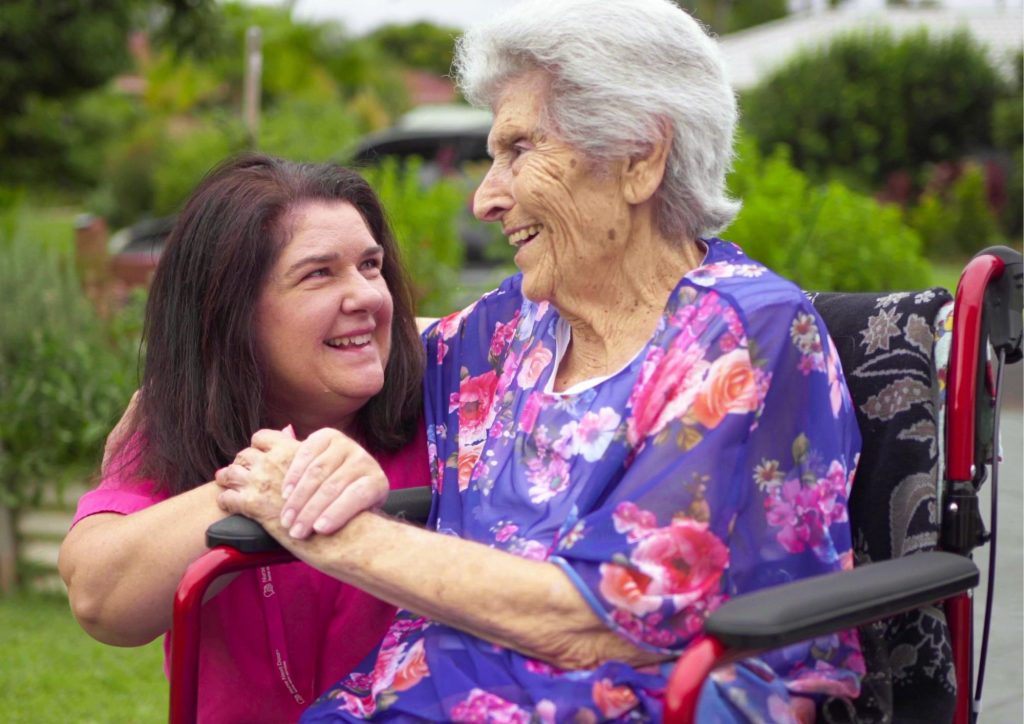What is In-home Respite Care and Why is it Important?
“Be there for others, but never leave yourself behind.” — Dodinsky
Caring for a loved one who is elderly, living with a disability, or suffering from a chronic illness can be an incredibly rewarding, but also challenging, role. It often involves long hours, as well as physical and emotional demands.
In the midst of providing constant care, family caregivers often forget to take care of themselves. That’s why in-home respite services are available to family members who may need a helping hand. In this blog, we’ll delve into what in-home respite care is, and the top 10 benefits respite care can provide so you can rest and recharge from your caregiving duties while your loved one continues to receive the necessary care they need.
Understanding In-Home Respite Care
In-home respite care is a service that offers temporary relief to primary caregivers, whether it is just a few hours, days, or weeks. It involves a trained caregiver coming into the home to provide care, companionship, and support for a predetermined period. There are several different types of respite services available including:
- In-home respite care
- Emergency respite care
- Residential respite care
- Center-based respite care
The Role of In-Home Respite Caregivers
Respite caregivers are skilled professionals or trained individuals who can offer a range of services tailored to the specific needs of your loved one an can range from a wide variety of services can including:
Personal Care
Assisting with activities of daily living such as bathing, dressing, and grooming.
Medication Management
Ensuring that your loved one takes their prescribed medications correctly and on time.
Companionship
Providing emotional support, engaging in conversations, and offering social interaction to combat loneliness and isolation.
Meal Preparation
Preparing nutritious meals and snacks that meet dietary restrictions or preferences.
Light Housekeeping
Helping with light chores, such as laundry, tidying up, and maintaining a safe and clean environment.
Transportation
Assisting with transportation to medical appointments, social outings, or errands.


The Top 10 Benefits of Respite Care
The role of a caregiver can sometimes feel like an unending marathon, and without proper support, it can lead to burnout, stress, and health issues.
That’s where respite care comes in, offering a vital lifeline to caregivers and their loved ones. The top 10 benefits of respite care include:
1. Preventing Caregiver Burnout
Perhaps the most critical benefit of respite care is its ability to prevent caregiver burnout. Caregiver burnout is a state of physical, emotional, and mental exhaustion resulting from the constant demands of caregiving. Respite care provides caregivers with a much-needed break, allowing them to rest, recharge, and come back to their caregiving role with renewed energy.
2. Ensuring High-Quality Care
When family caregivers are well-rested and emotionally balanced, they can provide higher-quality care to their loved ones. Respite care ensures that your loved one continues to receive excellent care even when you take a break to focus on your own health. It helps maintain a consistent level of support and attention to your loved one.
3. Promoting Caregiver Well-Being
Caregivers often put their own well-being on the back burner while tending to the needs of their loved ones. Respite care allows caregivers to prioritise their health, attend medical appointments, exercise, or simply relax. This, in turn, helps you maintain your physical and mental health in the long run.
4. Strengthening Family Relationships
Caring for a loved one can strain family relationships with your loved one and other family members due to the stress and demands of the role. Respite care allows you to spend quality time with your loved ones without the constant worry and stress of caregiving duties. It strengthens family bonds and prevents potential conflicts.
5. Tailored to Individual Needs
Respite care is highly flexible and can be tailored to meet the specific needs of both the caregiver and the care recipient. Whether it’s a few hours of care per week or a more extended period, respite care services can be adjusted according to your schedule and your loved one’s requirements.


6. Reducing Stress and Anxiety
Taking regular breaks through respite care significantly reduces the stress and anxiety experienced by caregivers. Knowing that a trained professional is temporarily taking over your caregiving responsibilities provides peace of mind and allows you to relax during your respite time.
7. Enhancing Your Loved One’s Well-Being
Respite care can be a refreshing change for your loved one. Interaction with a different caregiver can stimulate mental and emotional well-being, prevent isolation, and provide companionship. It introduces variety and social engagement into their routine.
8. Flexibility in Care Services
Respite care services are not one-size-fits-all. They can encompass various types of care, including personal care, companion care, medical care, and special needs care. This flexibility ensures that the specific needs and preferences of your loved one are met.
9. Promoting Independence
Respite care also encourages your loved one to build on and maintain their independence. It allows them to interact with different caregivers, build trust, and adapt to varying caregiving styles. This can boost their self-confidence and autonomy in the long term.
10. Peace of Mind for Caregivers
Perhaps most importantly, respite care provides you with peace of mind. You can take a break knowing that your loved one is in capable hands. This reduces anxiety and allows you to fully enjoy your respite time, knowing that everything is under control.
Accessing Respite Care
If you’re a caregiver or know someone who could benefit from respite care, here are steps to access this invaluable service:
Determine Your Needs
Assess how often you need respite care and the specific services required, considering your loved one’s condition and preferences.
Research Providers
Look for reputable service providers in your area like Nurse Next Door Home Care Services. Seek recommendations from healthcare professionals, support groups, or friends who have used respite care services.
Evaluate Caregiver Qualifications
When considering respite care providers, assess their qualifications, certifications, and experience in caregiving. Ask for references if needed.
Arrange a Meeting
Schedule a meeting or interview with potential respite caregivers to ensure they are a good match for your loved one.
Develop a Care Plan
Collaborate with the chosen respite caregiver or Care Designer to create a detailed care plan. This should outline the schedule, tasks, and any specific instructions or preferences related to the care recipient.
Open Communication
Maintain open and ongoing communication with the care team to address any concerns, provide updates on the care recipient’s condition, and ensure a seamless transition during respite periods.


Respite care is a lifeline for caregivers and their loved ones. It not only prevents caregiver burnout but also maintains the quality of care, promotes caregiver well-being, strengthens family relationships, and enhances the overall well-being of the care recipient.
By providing essential support and relief, respite care ensures that caregiving remains a sustainable and fulfilling journey for everyone involved. Remember, it’s not a sign of weakness to seek respite care – it’s a smart and compassionate choice that benefits both you and your loved ones.
